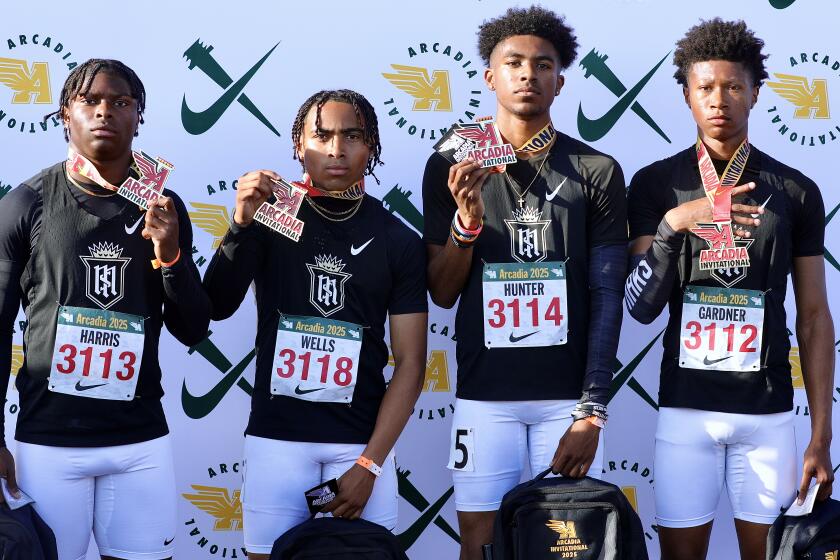Safe or ‘Out’: The Major League Issue Many Face
- Share via
So there’s a prominent major league ballplayer who’s gay and whose boyfriend, a magazine editor, wants him to come out of the closet. He thinks it’d be good for the athlete.
Yeah, just like a Randy Johnson fastball in the rib cage.
Maybe someday, much later in the current millennium, no one will care whether prominent athletes, movie stars or politicians--or their next-door neighbors--are gay.
At best, a prominent ballplayer who reveals his homosexuality today would be a curiosity item. At worst, and far more likely, he’d be subjected to the kind of vitriol no one would want. His life might return to normal, or it might not.
Would you take the chance?
The issue surfaced in the May issue of Out magazine, when editor Brendan Lemon began his monthly column this way: “For the past year and a half, I have been having an affair with a pro baseball player from a major league East Coast franchise, not his team’s biggest star but a very recognizable media figure all the same.”
Lemon concedes the “irony” of being editor of a gay magazine and “skulking around with someone so deep in the closet.”
Lemon wants the player to “out” himself. “I have spent many nights, awakened by a 3 a.m. phone call after a West Coast game,” Lemon wrote, “talking with this guy about his homosexuality . . ., and I have concluded that coming out would, on balance, lessen his psychic burden.”
Reading that prompted me to call Jim Toledano, a 57-year-old Santa Ana business lawyer and former head of the Orange County Democratic Party. His marriage of 27 years produced two children but ended when Toledano informed his wife he was gay. In August 1999, Toledano went public in an interview with OC Weekly.
“I’m utterly convinced that normal, healthy people don’t care [about another person’s sexual orientation],” Toledano says, “and the majority of people are normal, healthy people.”
Toledano says he’s done a lot of researching of the subject and concludes that people with a fundamental aversion to homosexuality are reacting to their sense of “security” about their own sexuality.
He no longer accepts the argument that people oppose homosexuality on religious grounds, arguing that those same people don’t literally embrace everything else in the Bible.
Philosophy aside, how has life been since Toledano went public?
“It’s unbelievably better,” he says, “because I am myself. All the aspects of myself that I was hiding without even being aware of it. Stifling reactions, responses, being shocked by things about myself . . ., that’s all gone.”
Toledano sympathizes with the unnamed ballplayer, imagining that his life involves “incredible psychic and emotional burdens of not being himself in front of other people” and “second-by-second” self-censorship.
Sadly, that is what an intolerant society does to gay people. It deprives them of the freedom to live an open and honest life and to do things as basically human as talking about the people closest to them.
The time spent hiding one’s homosexuality, Toledano says, can be “depressing, demoralizing and physically debilitating, because you spent your time protecting yourself, and that’s exhausting.”
Toledano’s public disclosure came when he was 55. Unlike many closeted gays, his life hadn’t been miserable. It just wasn’t honest.
All things being equal, Toledano wishes the ballplayer would come out of the closet. The more society sees gays in everyday situations, the less the stigmatizing, Toledano says.
Still, he’d never suggest the editor “out” the ballplayer, nor would he urge the player to go public.
“Until we live in a world, which we never will, in which all these things are not an issue to anybody,” Toledano says, “it’s got to be an individual choice.”
So who is he? A pitcher? A shortstop? One of the league’s top 10 hitters? One of the Yankees?
Whoever he is, this ballplayer, like so many other Americans, lives in a supposedly free society that keeps part of his soul locked up.
Compared to that, taking a Randy Johnson fastball is a lark.
*
Dana Parsons’ column appears Wednesdays, Fridays and Sundays. Readers may reach Parsons by calling (714) 966-7821 or by writing to him at The Times’ Orange County edition, 1375 Sunflower Ave., Costa Mesa, CA 92626, or by e-mail to dana.parsons@latimes.com.
More to Read
Go beyond the scoreboard
Get the latest on L.A.'s teams in the daily Sports Report newsletter.
You may occasionally receive promotional content from the Los Angeles Times.










